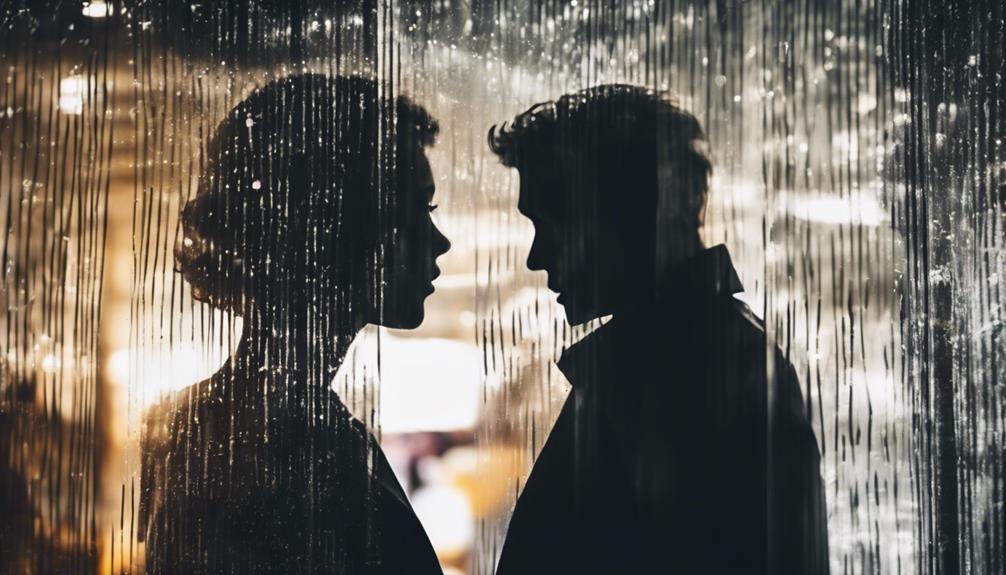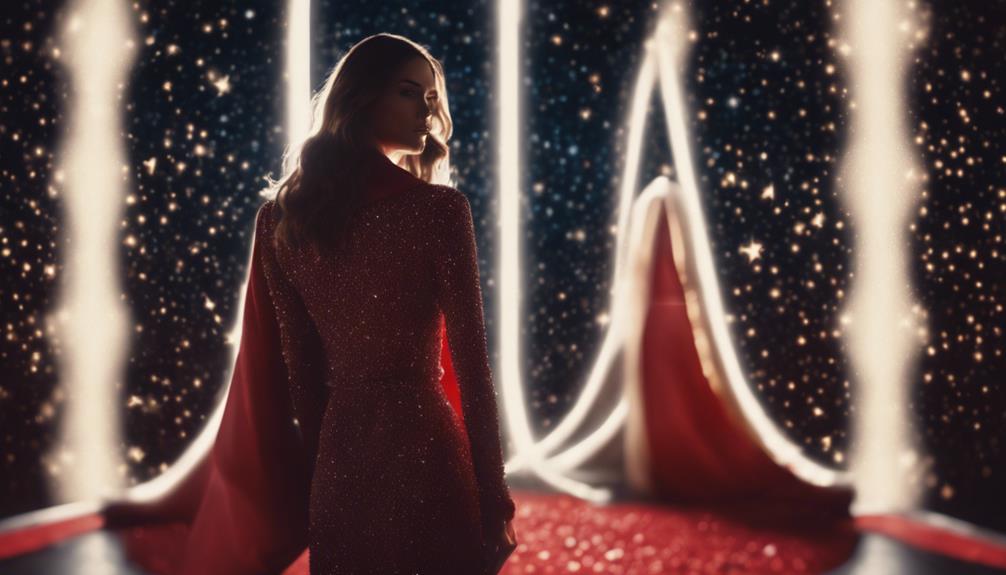Celebrities fiercely protect their public personas through strategic legal measures, online reputation management, and digital footprint control to shield against slander and unauthorized use. They wield the right of publicity to control their name, image, and likeness, and utilize defamation law to balance free speech with reputational protection. Consent and waiver agreements establish legal boundaries, while post-mortem persona protection safeguards deceased celebrities' legacies. Expressive works exemptions and Copyright Act safeguards further shield their images. By understanding these strategies, celebrities can proactively manage their online presence and safeguard their reputation. There's more to uncover about the intricate world of celebrity persona protection.
Key Takeaways
• Celebrities fiercely protect their right of publicity to control the commercial use of their name, image, and likeness.
• Defamation law holds public figures to a higher standard of proof, balancing free speech with reputational protection.
• Consent and waiver agreements establish legal boundaries, with implied consent based on a reasonable person's expectations.
• Expressive works exemptions, such as in movies and books, are protected by the First Amendment, with a lower burden of proof for public figures.
• Online reputation management is crucial for controlling digital footprint and preventing the spread of false information.
Celebrity Right of Publicity
Celebrities fiercely protect their right of publicity, which grants them control over the commercial use of their name, image, and likeness. This right is vital for public figures, as it enables them to prevent unauthorized use of their persona for commercial gain.
Celebrities can enforce their right of publicity to deter exploitation, ensuring that their personal brand and commercial interests are safeguarded. The unauthorized use of a celebrity's persona can lead to legal action based on the right of publicity, highlighting the significance of this right for celebrities.
By exercising their right of publicity, celebrities can safeguard their reputation and maintain control over how their image is used commercially. This right is particularly important in today's digital age, where the misuse of a celebrity's image can have far-reaching consequences.
Defamation Law Protection

In the domain of defamation law, public figures like celebrities are held to a different standard, requiring them to prove that false statements were made with actual malice. This higher standard is due to the First Amendment, which protects free speech and is balanced against reputational protection. Public figures must understand the complexities of defamation law, as they have better access to the media to counteract defamatory statements against them.
| Category | Private Individuals | Public Figures |
|---|---|---|
| Legal Standard | Lower standard of proof | Higher standard of proof |
| Access to Media | Limited access | Better access to counteract defamatory statements |
| Reputational Protection | More protected | Less protected due to public presence |
Understanding the distinction between public figures and private individuals is essential in defamation law. Courts believe public figures require less reputational protection due to their public presence, making it vital for celebrities to be aware of their rights and protections under defamation law. By doing so, they can effectively shield themselves against slander and protect their public persona.
Consent and Waiver

Celebrities shield themselves from slander by establishing legal boundaries through consent and waiver agreements. These agreements define the terms of use for their public personas, and understanding their nuances is essential for protecting their reputation.
Legal Boundaries Defined
The legal boundaries of defamation are greatly influenced by the concept of consent, which can be either express or implied in public figure cases. In the context of public persona protection, consent plays a pivotal role in determining the limits of defamation.
Implied consent, in particular, is evaluated based on a reasonable person's expectations of privacy and publicity. However, public acts don't always imply consent for the use of a public figure's persona. Legal disputes may arise over the fairness and validity of implied consent in public persona protection.
For instance, a celebrity's public appearances may not necessarily imply consent for the use of their image or likeness. Understanding the nuances of consent and waiver is essential in determining the boundaries of public figure protection against slander.
Waiver Agreements Explained
To ensure effective protection of their public persona, celebrities often rely on waiver agreements that explicitly outline the terms of consent and waiver. These agreements play a vital role in public persona protection, as they involve obtaining consent from individuals to use their likeness or image. By outlining specific purposes for which the individual's image or likeness can be used, waiver agreements help prevent potential legal claims related to unauthorized use.
Some key aspects of waiver agreements include:
- Obtaining consent from individuals to use their likeness or image
- Specifying the purposes for which the individual's image or likeness can be used
- Outlining consent and waiver clauses that grant rights and impose limitations
- Protecting against legal claims related to unauthorized use
- Providing clear and detailed terms for both parties to understand their rights and obligations
Consent Forms Decoded
By explicitly outlining the terms of consent and waiving certain rights, consent forms provide a safeguard against unauthorized use of a celebrity's image or identity. These forms clarify the scope of consent for specific uses of a celebrity's likeness, ensuring that both parties are aware of the agreed-upon terms.
| Aspect | Purpose |
|---|---|
| Explicit consent | Outlines terms of consent for specific uses |
| Waivers | Defines limitations of use and compensation |
| Agreed-upon terms | Ensures clarity and understanding for both parties |
Through consent forms, celebrities can maintain control over their public persona protection, preventing unauthorized or harmful exploitation. By understanding the details of these forms, celebrities and those seeking to use their likeness can establish a mutually beneficial agreement. In the context of public persona protection, consent forms serve as an important legal safeguard, providing a clear outline of agreements and waivers. By incorporating these forms into their public persona protection strategy, celebrities can shield themselves against slander and unauthorized use of their image or identity.
Post-Mortem Persona Protection

Heirs of deceased celebrities can safeguard the rights to the celebrity's image, likeness, and persona through post-mortem persona protection, an essential step in preserving their legacy. This protection allows them to control how the celebrity's image is used, ensuring that their memory is respected and their legacy is protected.
Some key aspects of post-mortem persona protection include:
- In California, heirs can take legal action to protect the deceased celebrity's image, thanks to a cause of action for post-mortem persona rights.
- However, California also has a blanket exemption for expressive works, limiting the ability to control the use of a deceased celebrity's likeness in certain contexts.
- Heirs may consider pursuing legal action in states without exemptions to strengthen post-mortem persona protection.
- Understanding the nuances of post-mortem persona rights is vital for heirs looking to preserve and control the legacy of deceased celebrities.
- Post-mortem persona protection is particularly important in cases where the deceased celebrity's image is highly valuable or sensitive.
Expressive Works Exemptions

Celebrities' likenesses are often used in expressive works, such as movies and books, which are generally protected by the First Amendment, but exemptions and nuances apply. As public figures, celebrities have a lower burden of proof in defamation cases. However, the First Amendment protection can be a strong defense for creators of expressive works.
| Type of Work | Level of Protection |
|---|---|
| Movies and books | Generally protected by the First Amendment |
| Advertisements | Exception to protection, not considered expressive works |
| Transformative works | Varying levels of protection, depending on added expression or meaning |
The predominant purpose of making a comment about a celebrity in an expressive work can serve as a defense. For instance, a movie or book that critiques a celebrity's actions or opinions may be protected as free speech. However, if the work is deemed to be an advertisement or a commercial use, it may not be protected. The distinction between expressive works and advertisements is vital in determining the level of protection afforded by the First Amendment.
Copyright Act Safeguards

The Copyright Act provides safeguards against unauthorized use of celebrity personas by preempting right of publicity claims in cases involving creative works. This preemption is essential in protecting celebrities from slander and misuse of their personas. Courts have recognized that the Copyright Act and right of publicity protect different interests in legal disputes, emphasizing the importance of both laws in shielding celebrity personas.
Some key aspects of Copyright Act safeguards include:
- Preemption of right of publicity claims in cases involving creative works
- Recognition of different interests protected by Copyright Act and right of publicity
- Advertising not exempt from Copyright Act preemption in cases related to celebrity persona rights
- Disclaimers potentially allowed as a defense in cases involving AI use of celebrity personas without proper authorization
- Implications of allowing disclaimers as a defense in AI usage on the protection of the right of publicity
Legal Remedies for Slander

Legal remedies for slander provide individuals, including celebrities, with a means to seek justice and restore their reputation in cases where false spoken statements have caused harm. In such cases, filing a defamation lawsuit in court is a viable option. Slander laws aim to balance free speech rights with protecting individuals from false accusations, ensuring that public figures, in particular, aren't unfairly targeted.
However, public figures face higher legal thresholds in proving slander due to their status. Damages in defamation cases may include compensation for harm to reputation. To succeed in a defamation lawsuit, plaintiffs must prove that the defendant made a false statement, the statement was communicated to someone else, and the plaintiff suffered harm as a result.
Slander laws are in place to protect individuals from malicious statements, while also upholding the principles of free speech. By understanding these laws and remedies, individuals can take action to defend their reputation and seek justice when necessary.
Persona Protection Strategies

Celebrities employ persona protection strategies to safeguard their public image, and online reputation management is a pivotal aspect of this. By controlling their digital footprint, celebrities can prevent the spread of false information and maintain a positive online presence.
Separating their private life from their public persona is also essential in shielding against slander and defamation attacks.
Online Reputation Management
By proactively shaping their digital footprint, celebrities can effectively shield themselves against slander and maintain a positive online persona. Online reputation management involves actively monitoring and controlling a celebrity's digital presence. This includes employing strategies such as search engine optimization and content creation to shape their online image.
To achieve this, celebrities utilize:
- Social media monitoring tools to identify and address potential reputation threats in real time
- Crisis communication plans to address and manage online attacks on their reputation
- Engaging with fans and followers positively to enhance their online reputation and mitigate negative publicity
- Online reputation management to actively monitor and control their digital presence
- Content creation to shape their online image and maintain a positive online persona
Digital Footprint Control
Through strategic persona protection strategies, celebrities can effectively control their digital footprint, shielding their reputation from potential threats and maintaining a positive online image. Monitoring digital footprints involves tracking online mentions, social media posts, and search engine results related to a celebrity's persona.
By implementing search engine optimization (SEO) strategies, celebrities can push down negative search results and promote positive content. Engaging in online reputation management techniques like content creation, social media monitoring, and review management is essential for controlling a celebrity's digital presence.
Utilizing tools like Google Alerts, social media listening platforms, and online monitoring services can help celebrities stay informed about their online reputation. By proactively addressing any negative content through legal actions, content removal requests, or online reputation repair services, celebrities can maintain a positive public image.
Effective digital footprint control is vital in today's digital age, where online reputation can make or break a celebrity's career.
Private Life Separation
To maintain a positive public image, separating their private lives from their public personas is an essential strategy celebrities employ to shield themselves from slander. By doing so, they create a clear distinction between their personal and professional lives, reducing the risk of slander and reputational damage.
Celebrities employ various privacy measures to separate their private lives from their public personas. These measures include:
- Implementing non-disclosure agreements with staff and associates to safeguard private information
- Utilizing secure communication channels and encrypted devices to enhance personal data protection
- Engaging in off-grid activities and avoiding public exposure to maintain privacy boundaries
- Creating a clear delineation between public appearances and private affairs
- Implementing strict privacy measures to separate personal and public lives effectively
Frequently Asked Questions
How Do Celebrities Protect Their Privacy?
Celebrities protect their privacy by employing multiple strategies.
They hire security teams to monitor and control access to their personal information and physical spaces.
Additionally, they utilize legal measures like non-disclosure agreements to safeguard their private lives and prevent unauthorized disclosures.
They also implement strict social media policies and monitor online activity to maintain control over their public image and prevent privacy breaches.
Why Are Celebrities Protected Under Right of Publicity?
Celebrities are safeguarded under the right of publicity to protect their economic interests and maintain the integrity of their public persona. This protection guarantees they have control over the commercial use of their name, image, and likeness, preventing others from profiting off their fame without consent.
Why Don T Celebrities Sue for Defamation?
Celebrities rarely sue for defamation, despite being frequent targets of false statements. In fact, only about 2% of defamation lawsuits in the US involve celebrities.
This reluctance stems from the high burden of proof required, including proving actual malice, which can be a challenging task. Additionally, legal fees, potential public scrutiny, and the desire to maintain a positive image often deter celebrities from pursuing defamation cases.
What Is the Right to Privacy of Celebrities and Public Figures?
Celebrities and public figures have a limited right to privacy due to their status. Their right to privacy is weighed against the public's interest in their lives.
Courts consider the newsworthiness of information when determining privacy rights. As public figures, they may have less protection against invasion of privacy compared to private individuals.
Conclusion
In the spotlight, celebrities are constantly at risk of slander, their reputations hanging precariously in the balance. But they're not defenseless. By leveraging the right of publicity, defamation law, consent, and post-mortem protection, they can safeguard their personas.
Like a shield, these legal safeguards deflect false claims, protecting their public image. With careful strategy and legal remedies, celebrities can silence slander and maintain their hard-won reputations, ensuring their star power endures.










